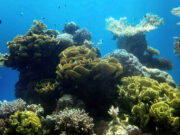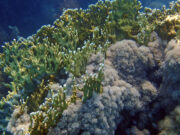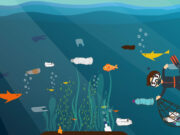We all want to protect the oceans from harm and conserve the dive sites we love, but it can be overwhelming knowing where to start. Thankfully it’s easy to make a difference at home and whilst travelling.
Here are our top tips to help save the oceans:
1. Choose sustainable seafood
If you eat fish or seafood it’s important you choose products that have been caught sustainably and without harming other marine life.
Unfortunately, many commercial fisheries overfish their target species and catch and kill unwanted marine life as well. Both of which threaten the long-term health of the oceans and survival of species.
You can choose sustainable seafood products easily using online ‘good fish guides,’ which are available for numerous countries around the globe. These include:
WWF Sustainable Seafood Guides (numerous worldwide countries)
Marine Conservation Society’s Good Fish Guide (UK)
Monterey Bay Aquarium’s Seafood Watch (USA)
Sustainable Seafood Guide (Australia)
Forest and Bird’s Best Fish Guide (New Zealand)
2. Ditch the car & buddy up
Using the car less and opting for public transport instead is an easy way to reduce your carbon emissions and help limit the effects of climate change.
Choose walking or biking and you can get fit at the same time.
If you can’t manage without a car for your commute, why not try car-sharing with a colleague instead?
3. Eat less meat
Cattle have high greenhouse gas emissions and intensive animal farming uses large amounts of water, fertiliser and land.
All of which can contribute to dry watercourses, pollution run-off into oceans and the loss of forested land.
Having a meat-free night, or eating more plant-based food, is a great way to reduce your carbon footprint further.
4. Shop local
Eating locally and seasonally also helps reduce your carbon footprint, by cutting down on carbon emissions from food transport.
Many fresh items in supermarkets have been transferred numerous miles by air and road, often internationally.
By checking your labels and choosing local food, you’ll be supporting local growers and eating fresh food full of nutrients.
5. Carbon offset travel
It’s easy to offset the carbon from your travel and the UN Carbon Offset platform has a variety of carbon offsetting projects you can choose from.
Some airlines also offer carbon offsetting at the time of booking.
Other ways you can be eco-conscious when you fly include:
• Pre-booking your meal on your flight, so the airline doesn’t need to produce spare meals that may be wasted
• Take your own refillable water bottle and reusable coffee cup, so you can avoid using disposable cups on flights
• Pack a jumper in your hand luggage, so you don’t need to use one of the pre-supplied blankets that come wrapped in single-use plastic
6. Switch to LED
We all know it’s important to turn off lights to reduce our electricity use, but switching to LED bulbs at home is even better.
These energy-saving bulbs can last for over 50,000 hours and don’t need changing for a very long time.
7. Goodbye Plastics!
If you’ve already stopped using single-use plastic bags, try these steps to reduce your plastic use even further:
• Use a refillable non-plastic water bottle throughout the day rather than purchasing single-use bottled drinks
• Choose tea leaves rather than tea bags. Tea bags often come wrapped in cellophane and the tea bags themselves also often contain plastic
• Save your glass jars and use them for bulk refilling of dry pantry goods at your local shops
• When plastic items run out, replace them with non-plastic versions. It’s easy with so many online shops offering non-plastic biodegradable household items that work really well
8. Reduce, reuse, recycle
Rather than relying on recycling being enough, remember it’s better to reduce the amount of new items you buy and reuse or repair what you already have.
This helps reduce carbon emissions from new items being produced.
How you can help save the oceans whilst travelling
You can apply many of the tips above when you’re travelling. Some extra steps to take include:
• Choose reef-safe sunscreen so you won’t be harming coral reefs whilst you dive. Non-chemical sunscreen with a non-nano zinc oxide base is often the best reef-safe option.
• Take a reusable metal straw for your post-dive evening cocktail when you’re cruising idyllic destinations such as the Maldives
• Choose natural skincare and haircare products to reduce the amount of chemicals entering the oceans. If you use leave-in conditioner when diving, use a non-silicone natural conditioner.
• When you replace your old swimwear/clothing, choose ocean positive swimwear and sustainable clothing. Many dive brands produce recycled swimwear made from ocean litter and sustainable clothing that doesn’t cost the earth
This article was written by divers and writers at LiveAboard.com


















